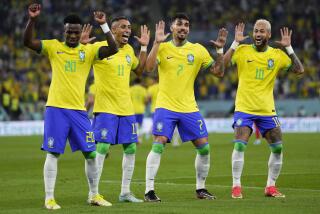Cup Conductors
- Share via
YOKOHAMA, Japan — Two extraordinary transformations have occurred at the World Cup, both involving the coaches who will be on the sideline for Sunday’s final in the gray concrete fortress that is this port city’s International Stadium.
Luiz Felipe Scolari, the sergeant major with the clipped mustache who rules Brazil’s team with a sharp tongue and an iron hand, has changed into a coach willing to allow his players the freedom to create and to play the “jogo bonito” he once ridiculed.
Against all odds, the “beautiful game” has flowered again under Scolari’s care.
Meanwhile, over in Germany’s camp, Rudi Voeller, the curly-haired maestro in the rumpled brown suit who was the scourge of opposing defenders in his days as a world-class and World Cup-winning striker, has become someone who sees defense, not offense, as the way to bring the Cup back to Germany four years before it hosts the tournament.
Against all odds, the player who scored 47 goals in 90 games for Germany is getting increasingly adept at devising tactics that prevent goals.
“We have a very good goalkeeper [Oliver Kahn] and we are very good at set pieces,” Voeller explained. “It’s no shame to win games that way.”
They are very different men, these two coaches, but they covet the same goal.
Scolari wants to lead Brazil to its fifth World Cup title; Voeller wants to guide Germany to its fourth.
Oddly, neither man was his country’s first choice for the job.
Scolari inherited the position after a succession of failures by his predecessors, most notably at the 2000 Sydney Olympic Games and the 2001 FIFA Confederations Cup. He was more or less a last resort for the CBF, Brazil’s soccer federation.
Voeller, on the other hand, came to the rescue of the DFB, Germany’s soccer federation, after its chosen coach, Christoph Daum, shot himself down in spectacular fashion by testing positive for cocaine.
And yet here they are, off the substitutes’ bench, so to speak, and one victory away from soccer’s most prized trophy.
Scolari, 53, is a large man, blunt and to the point. He is willing to do whatever it takes to win.
Voeller, 42, is a little smoother. His temper can be just as fiery as Scolari’s, but he is more diplomatic outside the locker room.
According to one colleague, Scolari, “says whatever is in his stomach,” a turn of phrase that fits the coach perfectly.
He can be biting, acidic, scornful, impatient, brash, temperamental--all these and more. But never boring.
Watching Scolari on the sideline is almost as entertaining as watching Brazil play. He is so demonstrative that the Brazilian TV giant, O Globo, keeps one camera trained on him. No one ever knows what he will say or do next.
Many Brazilians, among them several former national team players, disagreed strongly with his decisions in the months leading to the World Cup, but his honesty is respected.
In early May, when the media were calling him every name under the Brazilian sun for leaving 1994 World Cup hero Romario off his squad, Scolari said his duty was clear, no matter what was written or said about him.
“My son recently told me that winning is all that matters,” he said then. “It can only ever be like that because that’s how Brazilians are with football. There is this obligation to win.”
He put it another way too.
“If we have to play ugly to reach our objective, we will play ugly. What’s the point of a Cup? To be champions.”
But Scolari’s team has not played ugly. In fact, it delighted its fans and those of neutral nations by playing fast, free-flowing soccer in the early rounds, then showed the steel in its belly by playing one man short and defeating England in the quarterfinals.
That 2-1 come-from-behind victory has been the most satisfying of all for Scolari.
“As a coach, I have tremendous admiration for the previous [World Cup] teams, for everything they have done for Brazil,” he said afterward. “But I have never seen a Brazilian team with such a strong fighting spirit, with such a vibrant approach, as this team.
“I think this Brazil team is the ideal image of modern football. In addition to our [other] qualities, we have fighting spirit.”
Voeller has instilled the same self-belief in his team, drawing on his experience as a forward on the German team that lost to Argentina in the final of the 1986 World Cup in Mexico City and then rebounded four years later to defeat Argentina in the 1990 final in Rome.
“It’s very important to have a coach who has been through it all,” said Kahn, the goalkeeper whose on-field play and off-field leadership have given Voeller’s cause an ideal champion.
“I am realistic and aware of our limitations,” Voeller said. “We are a bit below teams like Brazil and England, who have more class than we have, but with our team spirit and a collective effort, we can beat any side.”
Voeller has tried to inspire his team by saying that it compares favorably to the Cup-winning squad he played on 12 years ago.
“In all honesty, we were not so good in 1990,” he said.
That team won the final, 1-0. This team has won its last three games by the same score.
It’s possible that both coaches could revert to form Sunday and that fans could be in for a dour battle.
Possible, but unlikely.
Having let the three genies out the bottle, Scolari will find it impossible to put Ronaldo, Rivaldo and Ronaldinho back in. Brazil will attack, whether Scolari likes it or not.
Likewise, having gone this far on the talent of Kahn and the fortitude of the defenders in front of him, Voeller will not suddenly go on the offensive and run at Brazil. He simply doesn’t have the players to do it.
So it will be Brazil’s offense against Germany’s defense, just as it should be.
But one can’t help thinking that Scolari might rather be directing the tough-as-nails German defenders and that Voeller might be far happier if he were orchestrating the Brazilians’ “Triple R” strike force.
More to Read
Go beyond the scoreboard
Get the latest on L.A.'s teams in the daily Sports Report newsletter.
You may occasionally receive promotional content from the Los Angeles Times.






